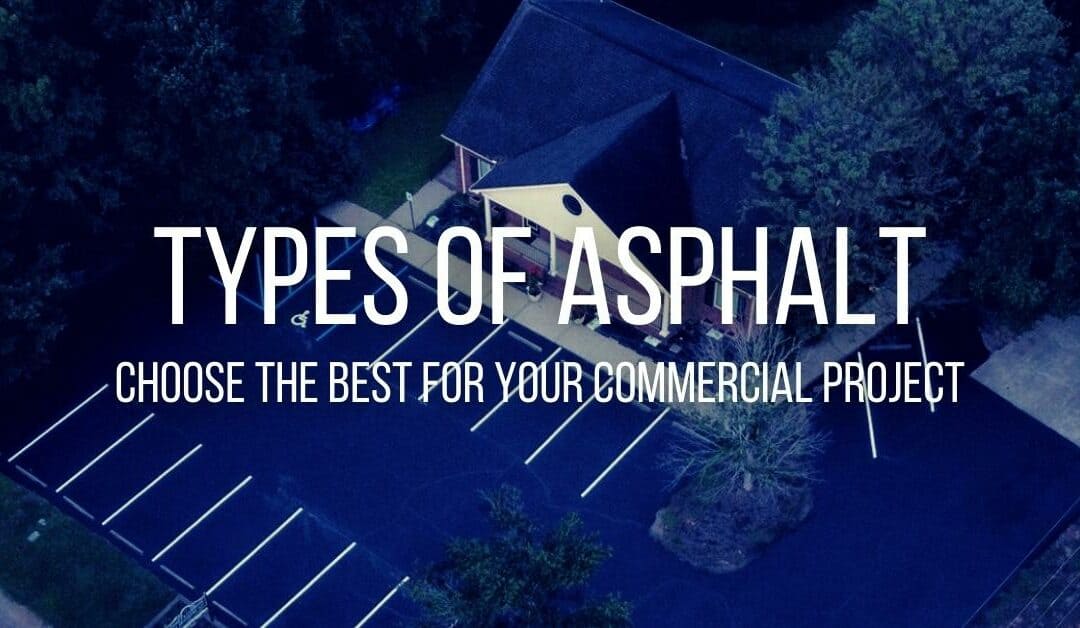There are many types of asphalt, and your contractor will recommend the best type for your commercial project. However, it’s helpful to understand the basics so you can communicate with your contractor and make the best decision for your needs. This blog post will look at the different types of asphalt and when you might use them!
Whether you’re planning a highway, a low-volume road, or a parking lot, the asphalt type your contractor uses will determine the integrity of your project.
Asphalt’s Many Names
You’ve probably heard asphalt called by many different names over the years. All the asphalt types contain aggregate and asphalt in varying amounts. A higher asphalt content
As a versatile pavement material, the different asphalt types often have names, including:
- Hot mix asphalt (HMA)
- Warm mix asphalt (WMA)
- Plant mix asphalt
- Asphalt concrete
- Bituminous concrete
- Blacktop
- Superpave
Hot Mix Asphalt (HMA)
A hot mix asphalt consists of a mixture of aggregate (crushed stone, gravel, and sand), bitumen, and liquid asphalt heated to temperatures between 275 and 325 degrees Fahrenheit.
Cold Mix Asphalt (CMA)
Cold mix asphalt consists of a mixture of emulsified asphalt, bitumen, and aggregate heated to a lower temperature between 0 and 100 degrees Fahrenheit.
Warm Mix Asphalt (WMA)
Warm mix asphalt consists of a mixture of emulsified asphalt, aggregate, and asphalt binder heated to a lower temperature between 200 and 250 degrees Fahrenheit.
What is Asphalt Design?
Contractors in South Carolina consider the SCDOT Pavement Design Guidelines whether designing an asphalt driveway, road, or lot.
When a contractor is choosing durable hot asphalt mixes, they consider many factors, including:
- The typical weather condition at your place of business
- Cost-effective mixtures for your budget
- Environmentally friendly factors such as using recycled materials
- Stormwater management
- Low-traffic areas of your parking lot vs. high-stress areas
- Your soil or subgrade materials and natural deposits
- Type of traffic (cars, trucks, RVs, etc.)
Asphalt is a versatile pavement material, and there are many types to choose from, depending on your needs. You’ll have a permanent solution with a licensed asphalt contractor in no time!
Type of Traffic Factors When Choosing Asphalt Mix
Your asphalt contractor chooses asphalt paving materials to carry many different types of vehicles, but the average traffic conditions determine the type of asphalt you’ll need.
The reason is that asphalt mix types designed for heavy traffic hold up under higher stress conditions. Heavy trucks can cause much more damage to asphalt pavements compared to autos. They cause much more damage to the different types of asphalt.
For example, a loaded 5-axle tractor trailer imparts more than 1600 times more damage than a typical passenger car and more than 200 times greater than a large sport utility vehicle (SUV).
Asphalt Pavement Types
Different classes of pavement divide asphalt mixes by their designed use. For great performance, the manufacturing process for each pavement class considers the potential use when mixing the raw materials.
Even in a smaller commercial project, you may have areas that your contractor designs with heavy-duty asphalt for a loading zone. (1)
Consider the types of asphalt your contractor may need for your project and their intended uses:
4 Class Hot Mix Asphalt (≤ 200 trucks/day)
- Major arterial streets
- Local business streets
- Local industrial streets
- Major service drives or entrances
3 Class Hot Mix Asphalt: (≤ 65 trucks/day)
- Collector streets
- Industrial lots and truck stalls
- Bus driveways and loading zones
2 Class Hot Mix Asphalt: (≤ 5 trucks/day)
- Residential streets
- Parking lots (> 50 stalls)
1 Class Hot Mix Asphalt: (≤ 50 cars/day)
If your project will likely see less than 50 cars per day, your contractor will choose a Class 1 hot asphalt mix for most of your project.
A Class 1 hot mix asphalt works well for:
- Driveways
- Play areas
- Parking lots (≤ 50 stalls)
- Seasonal recreation roads
A class 1 mix has a dense graded texture and looks dark, black, and smooth after a contractor lays it down. Most people enjoy this smooth, quiet pavement that reduces tire noise. The fine-graded texture gives it the smooth dark appearance that is so popular. Dense-graded mixes are common in commercial projects and residential driveway projects.
Bottom Line
Asphalt is a versatile pavement material for commercial applications. With the help of a licensed contractor, you can choose the best type of asphalt mix for your project.
Consider the types of traffic that will use your pavement and the climate when making your decision. You’ll have a durable, long-lasting solution that looks great too!
Our Experienced Licensed Asphalt Contractors Can Help
Not sure what types of asphalt you need for your project? Work with an experienced, licensed asphalt contractor to get the best results.
At AMP Paving, we work with commercial and residential projects to ensure your asphalt pavement project is successful. Contact us today for a free quote!

